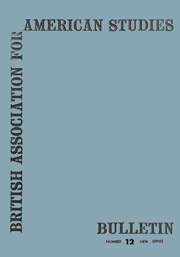Article contents
The Survey of Sources for American Studies in the United Kingdom
Published online by Cambridge University Press: 11 June 2012
Extract
(As the work of the Survey nears completion, its officers have little time to spare for tasks other than those that are necessary to bring this pioneering project to a conclusion. We are, therefore, indebted to Dr. Bernard Crick, Assistant-Director of the Survey, now in the throes of the last round-up, for the following letter from the field. We notice that Dr. Crick has strayed a little outside his province in his admonitions to some historians. But as he and his assistants have had a unique opportunity of examining local historical sources in this country, his opinion deserves a hearing, and we hope that his advice to historians whoso footsteps are led almost magnetically to Chancery Lane will not pass unnoticed.)
- Type
- Research Article
- Information
- Copyright
- Copyright © British Association for American Studies 1958
References
page 17 note 1 Cf. William Blake, “Nothing can be more contemptible than to suppose Public RECORDS to be True … Public Records! As if Public Records were True!” (Annotation to An Apology for the Bible in a Series of Letters addressed to Thomas Paino by R. Watson, D.D., F.R.S., written 1798). – Editor.
page 18 note 1 The Bulletin welcomes addenda, corrigenda and agenda of every description. – Editor.
page 18 note 2 Andrews, C. M. and Davenport, F. G., Guide to the Manuscript Materials for the History of the United States to 1783, in the British Museum, in Minor London Archives, and in the Libraries of Oxford and Cambridge (Washington, D.C., 1908)Google Scholar; Andrews, C. M., Guide to the Materials for American History, to 1783, in the Public Record Office of Great Britain (Washington, D.C. 1912–1914).Google Scholar
page 18 note 3 Paullin, C.O. and Paxson, R. L., Guide to the Materials in London Archives for the History of the United States since 1783 (Washington, D.C., 1914).Google Scholar
- 1
- Cited by


